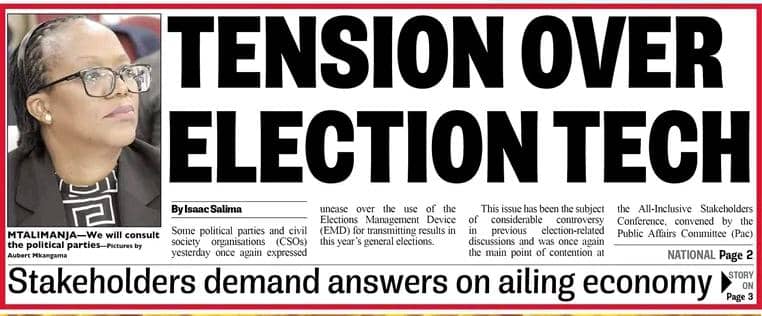By Burnett Munthali
Some political parties and civil society organisations (CSOs) have once again voiced their concern over the use of the Elections Management Device (EMD) for the transmission of results in the 2025 general elections.
The concerns were aired yesterday, reflecting a growing sense of unease among stakeholders about the credibility, transparency, and preparedness of the electoral process.
The EMD is an electronic tool designed to streamline various stages of election management, including voter verification, data capture, and most critically, the transmission of results from polling centres.
While the Malawi Electoral Commission (MEC) has insisted that the EMD enhances efficiency and reduces room for manual errors, its critics argue that the device lacks sufficient safeguards against manipulation and potential system failure.
Some political parties have warned that without an inclusive audit and consensus on the use of EMDs, the credibility of the forthcoming elections could be compromised.
CSOs have echoed this sentiment, calling for urgent stakeholder engagement and the establishment of contingency plans to mitigate the risk of technological glitches or cybersecurity threats.
They pointed to past regional experiences where electronic transmission systems either failed or were alleged to have been manipulated, leading to post-election disputes and erosion of public trust.
There are also calls for the electoral body to provide a comprehensive demonstration of the EMD system before the elections, including stress-testing it in real-time scenarios.
Some stakeholders emphasized the need for voter education to ensure that the public understands how the technology works and what measures are in place to guarantee integrity.
A few CSO representatives questioned whether MEC has conducted independent audits or allowed third-party technical experts to evaluate the reliability and security of the EMDs.
Political analysts say the concerns are valid, particularly in a political environment where suspicion and mistrust often shape public perception of electoral processes.
They noted that transparency, accountability, and inclusivity must guide any adoption of digital tools in elections, especially in a young democracy like Malawi.
MEC, on its part, has maintained that the EMD was piloted successfully in previous by-elections and that lessons learned from those experiences are being used to improve the system ahead of the 2025 polls.
However, critics argue that by-elections cannot be compared to the complexity and scale of a general election, which involves millions of voters, thousands of polling stations, and heightened political tension.
The growing skepticism underscores the importance of building broad consensus among all electoral stakeholders well ahead of polling day.
Only through inclusive dialogue, transparency in technological deployment, and robust risk mitigation can the nation move forward with confidence in its electoral process.
As the countdown to the general elections continues, the pressure mounts on MEC to allay fears and demonstrate that the EMD will strengthen, not undermine, the integrity of Malawi’s democracy.




